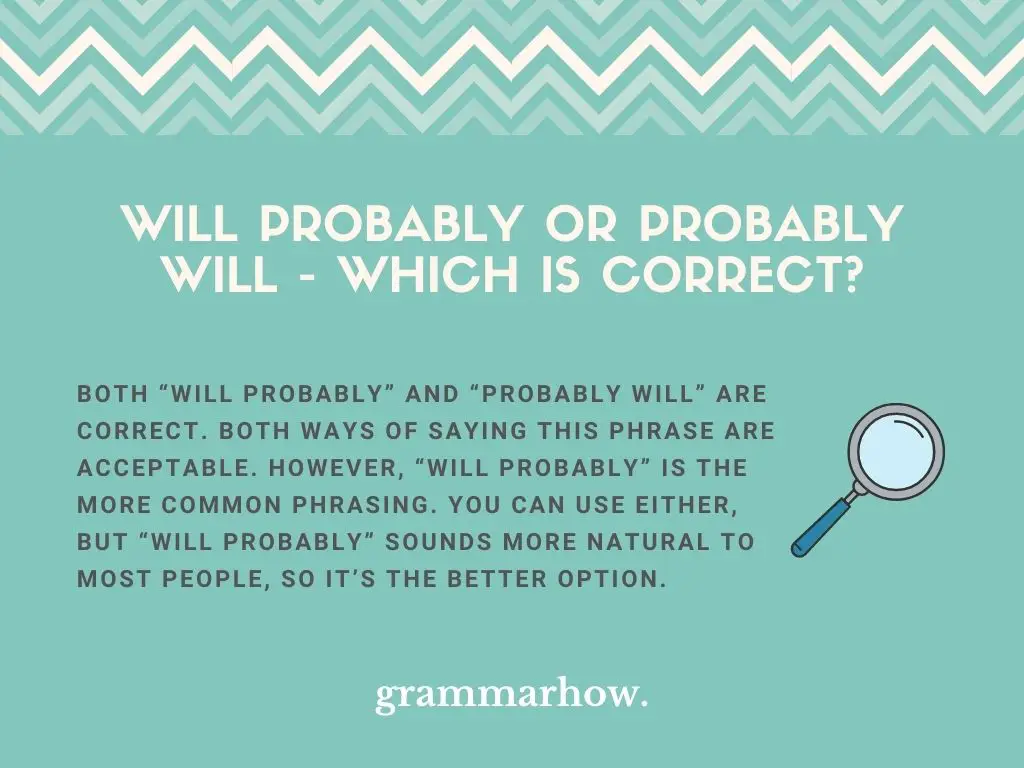So, you want to say that you are going to do something in the future. Do you say I “probably will” or “will probably” do it?
There seems to be little difference, after all. But that’s why it’s so easy to be unsure of the right answer.
In this article, we’ll tell you which option is correct and why.
Will Probably or Probably Will – Which Is Correct?
Both “will probably” and “probably will” are correct. Both ways of saying this phrase are acceptable. However, “will probably” is the more common phrasing. You can use either, but “will probably” sounds more natural to most people, so it’s the better option.

“Probably” is an adverb in “will probably”. With modal verbs like “will”, the adverb usually follows the verb. So “will probably” is the typical wording. Most people say the phrase like this.
However, adverbs can also add emphasis to verbs, so “probably” can come after “will” as well. In other words, both options are correct. It comes down to which one you think sounds best in most cases. Most people will see either choice as fine. Because of this, it’s mostly up to opinion.
Will Probably
“Will probably” means you are likely to do something. It’s not guaranteed, but likely. “Probably” is what changes “I certainly will” to “I likely will”. It changes the certainty of your words. So, anytime you are likely to do something, “will probably” works.
Consider the following examples:
- I will probably go to the mall.
- He will probably ignore me.
- Sam will probably call his mom.
- Adam will probably not show up.
Neither sentence expresses certainty. However, “will probably” is not more correct here than “probably will”. Either wording works here. The sentence just has to change a little bit to make the words fit.
Probably Will
“Probably will” says you are likely to do something. Not sure, but likely. “I will” is certain, but “probably” changes that certainty to a maybe. So, “probably will” works whenever you are not sure you will do something.
Consider the following examples:
- I probably will stay home today.
- She probably will call in sick to work.
- John probably will not be here.
- Sean probably will not do it.
These sentences do not express certainty. This is exactly the same as using “will probably”. Neither phrase is objectively better to use in any sentence, so it’s all about which one sounds better to say.
Most people think “will probably” sounds better. But that doesn’t mean “probably will” is wrong. Either one is acceptable and they are both used in the same contexts.
Conclusion
“Will probably” and “probably will” mean the same thing. They are just different ways to say it. Both mean “I will likely” do something, and both are correct.
Some people think “will probably” sounds better. However, that is just an opinion. You can use “probably will” in the same sentences and the meaning will not change. Because of this, you can use whichever phrase you think sounds best.

Martin holds a Master’s degree in Finance and International Business. He has six years of experience in professional communication with clients, executives, and colleagues. Furthermore, he has teaching experience from Aarhus University. Martin has been featured as an expert in communication and teaching on Forbes and Shopify. Read more about Martin here.
